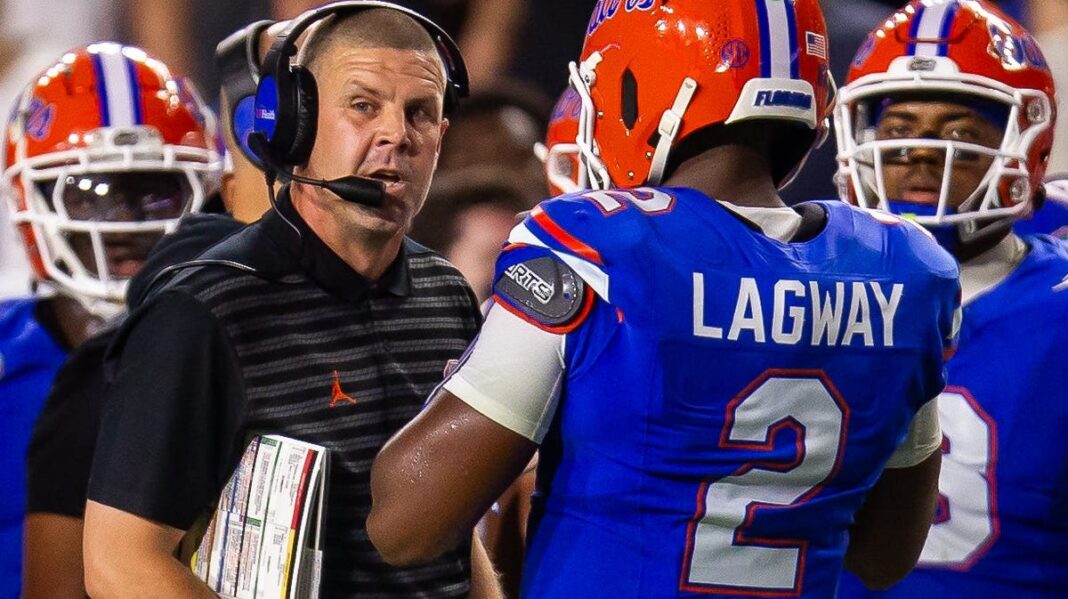Florida football players demanded change, and coach Billy Napier listened, which might save his job
Earlier this month, several players visited Billy Napier’s office to express their concerns, stating that changes were necessary.
The team had been suffering losses, and with Napier’s job on the line, the players sought alterations.
They emphasized the need to simplify the defense to have any chance of success moving forward, according to two sources who disclosed this information on the condition of anonymity due to the delicate nature of the situation.
Napier’s defense has historically struggled over the past two seasons and was lacking once again after the first month of this season. A lack of coordination in run defense, persistent issues with gap control, and too many complex coverages caused numerous blown assignments and big plays.
To Napier’s credit, he took the players’ feedback seriously.
Now, after three games, the changes have been striking as they prepare for Saturday’s match against fierce rival and No. 2 Georgia at the World’s Largest Cocktail Party. This may be a significant step in preserving Napier’s job.
The question has shifted from “when” Napier will be dismissed to “if,” thanks to this recent improvement.
“We must take great pride in our competition,” Napier remarked in his weekly press conference. He seemed to acknowledge the changes made over the past three weeks.
“We need to focus our efforts on productive outcomes and not waste our time on ineffective activities.”
Since the players urged changes, the defense has conceded a total of 56 points across games against Central Florida, Tennessee, and Kentucky (averaging 23.6 points per game), allowing around 298 yards per game.
In contrast, before these modifications, Florida was allowing an average of 34 points and 500 yards per game during three Power Four matchups against Miami, Texas A&M, and Mississippi State.
In fact, if Florida (4-3) hadn’t faced another special teams blunder against Tennessee that nullified a field goal at the end of the first half (a coaching issue), they would have achieved three consecutive victories since implementing defensive changes.
This sets the stage for a rivalry match that Florida has not won since 2020—a game that each season highlights how far behind Florida has fallen relative to Georgia and the top tier of college football.
Despite a challenging road ahead, there is renewed optimism for the Gators, amidst pressure from influential boosters to make a change and an administration advocating for patience, at least for this season.
This October improvement has presented Florida with hopes for a better outcome in the latter part of the regular season, even amid a challenging slate of games that could still jeopardize Napier’s future.
As for how many wins would guarantee his job security, one booster, who wished to remain unnamed due to the sensitive nature of the topic, indicated that six wins would be insufficient—seven wins would be necessary. Achieving seven victories implies Florida would have to secure three wins in a tough stretch featuring No. 2 Georgia, at No. 6 Texas, No. 16 LSU, No. 18 Ole Miss, and at Florida State.
Winning at least three out of the last five games would mean Florida would have to succeed at least twice as an underdog (only likely favored against Florida State), granting the team momentum heading into the 2025 offseason.
But for this to happen, the first step is to avoid another blowout against Georgia, a team that has triumphed in the last three games with a total score of 119-47. This record is unacceptable for a program that has significant potential for success and strong financial backing.
Florida’s boosters have already gathered the funds required to pay Napier’s $26 million buyout. However, interim president Kent Fuchs, who hired Napier three years ago and is preparing to retire, is staunchly advocating for more time to evaluate the season’s outcomes.
Fuchs did not return to navigate another presidential change (after the retirement of former Nebraska Senator Ben Sasse) just to be the one to dismiss Napier. In fact, he has consistently shown public support for Napier, encouraging him after each home game regardless of the outcome.
However, all this may become irrelevant if the Gators fail to reach seven wins.
“I believe the mindset has transformed a bit,” Napier stated. “There is a clear increase in effort, intensity, and execution in the game.”
In the months to come, we may view the players’ meeting with Napier as a pivotal moment for the season and his coaching career—unless, of course, Georgia continues its dominance over Florida as it has in recent seasons.
In that case, “if” could swiftly revert back to “when.”

